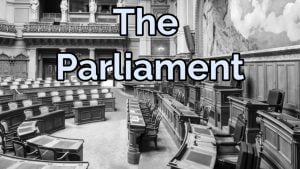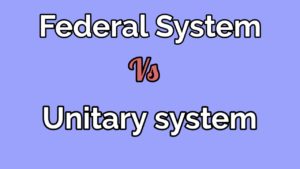Features of the uk Constitution: While there is no universally accepted definition of a Constitution, a Constitution may be referred to as the body of laws that describes the basic principles of a State, its structure, processes of Government, and fundamental rights of citizens in the state. According to Wikipedia, a Constitution is an aggregate of fundamental principles or established precedents that constitute the legal basis of a polity, organization, or another type of entity and commonly determine how that entity is to be governed.
There are broadly two types of constitutions namely: Written and Unwritten Constitution. An unwritten constitution is a Constitution in which the body of laws of a state is not embodied in a single document. The British Constitution falls within the category of an Unwritten Constitution, therefore making it unique and very important for us to examine the British Constitution particularly in the light of its features.

Recommended: Advantages and Disadvantages of one party system
Brief History of the British Constitution
The British Constitution could be traced through 1215 when Barons forced King John to accept the Magna Carta charter of England which limited the power of the king, thereby making the king subject to the laws of the land. From that time thereupon, more legislative enactments and unwritten rules which governed the people came into place. These legislative enactments, unwritten rules, judicial precedents, conventions, and treaties are what we refer to as the British Constitution.

Also see: Best shopping sites in the United Kingdom
Major Features of the uk Constitution
1. It is unwritten: One major feature of the British Constitution is that it is an unwritten Constitution. It is unwritten in that there is no codified or written constitution in Britain. The Constitution of Britain consists of acts of parliament, Court judgment, Conventions, and treaties.
2. It is flexible: The British Constitution is a flexible Constitution as it can be easily amended by the ordinary legislative process. The Constitution can be passed, amended, and repealed by a simple majority of the parliament. The flexibility of the British Constitution has been exemplified by the abolishment of laws such as the United Kingdom acts of Parliament, Statute of Westminster 1275, amongst others over the years.
Also see: 5 Interesting Ways to Improve Your Emotional Intelligence
3. Parliamentary Sovereignty: Unlike the United States where the Constitution is supreme, the Parliament in the United Kingdom is supreme. Parliamentary Sovereignty entails the supremacy of the legislative arm of government.
It implies that the powers of the legislature or parliament is unlimited by the constitution. Here, the people are the sovereign and final authority but the parliament has unlimited powers to make and repeal any law with respect to any matter in the country. The Parliament can make and unmake as it has unlimited powers to do anything. This unfettered powers of the parliament account for its supremacy in the United Kingdom.
Simply put, the parliament in the United Kingdom is the supreme legal authority and not even the courts have the power to overrule any legislation passed by the parliament. Again, parliament cannot pass a law that prohibits future parliaments from changing it.
To this, even though the parliament has all what it takes to make any law as it wishes, the laws made by it are not cast in stone that it cannot be amended or changed by another parliament. A law made by it cannot exist in perpetuity neither can it be immutable. Any law so made only subsist as the enacting parliament so desires and can also be changed by it or future parliaments.
Also see: Exceptions to the rule of delegatus non potest delegare
4. Unitary System of Government: A Unitary system of government is one in which the powers of government is concentrated at the centre with the subdivisions merely existing at the pleasure of the central government. The central government may create or abolish any constituent unit as it deems fit; and may delegate any of its powers to any constituent unit as it also deem fit.
A Unitary state has a common military, police, currency, etc and does not share or devolve powers to constituent bodies. In fact, any constituent units created are not equals with the central government and has no real powers to enforce anything within its control.

The UK Constitution creates a Unitary system of government in the United Kingdom. In the UK, all powers are concentrated at the centre and the centre only delegates such powers as it deems it necessary to subordinate units. It is only the central government that legislates for the entire country, as no other legislature exists aside it.
5. Parliamentary Government (Cabinet System of Government): The British Constitution establishes the cabinet system of government. A cabinet system of government is that system of governmental administration in which the executive and legislative arm of government is fused. There is a fusion of these two arms of government, such that the executive arm is picked from the parliament.
The Prime Minister is the Head of Government and also the head of the majority or ruling party. The Prime Minister being the Head of Government, heads the executive arm of government and is also the leader of the legislature as he also comes from the elected parliamentarians. However, the Prime Minister is not the Head of State.
A prominent characteristic feature of the cabinet system of government is the existence of collective responsibility. The ministers of the government is not responsible individually to the electorate but they are collectively responsible to the electorate.
The failure of one of the ministers is seen as the failure of the entire government which may see to the resignation of the entire cabinet. This was seen in the recent resignation of the former Prime Minister of the UK at the exit of UK from the European Union in 2020.
Also see: Process of law making in Canada
6. Constitutional Monarchy: One of the key features of the British Constitution is the acknowledgement of a Constitutional Monarch. The British Monarch is the Head of State and does not possess the powers to make laws as this power resides in the elected parliament.
Historically, the British Monarch had absolute powers.This was however curtailed by the Bill of Rights Act of 1689 and the Act of Settlement of 1701 which were passed after the Glorious Revolution of 1688. The role of the British Monarch was thus limited to certain functions of State by the Constitution. The Parliament makes laws and allocates budgets for the maintenance and upkeep of the Palace.
Thus, the Constitution recognizes the Monarch as the sovereign symbol of the state, who performs ceremonial functions with no real political influence on the government.
7. The Rule of Law: The rule of law is a principle or concept of law which presupposes that everyone is equal before and accountable before the law irrespective of class or status. All institutions of the state are equally accountable to the laws of the state as their actions must be in tandem with the dictates of the law.

This is one of the principles deeply entrenched in the Constitution of the United Kingdom. This principle espouses the independence of the judiciary to ensure that the rule of law is upheld. While the parliament is supreme and can make laws, the power granted it to make such laws is curtailed if such laws made contravenes the provisions of the Human Rights Act 1998, Universal Declaration of Human Rights and other International Covenants.
The Higher court is empowered to make a review of any such Act of Parliament that is inconsistent with these laws, as the laws have overtime become part of the Constitution. The Parliament acquiesces that the Higher Court can actually inquire into the validity of the laws if they are in contravention of the rights of citizens.
For more interesting features of the british constitution, I highly recommend that you watch the YouTube video below. Trust me, you will enjoy it!
RECOMMENDED: Differences between presidential and parliamentary system of government
These key features of the British Constitution make it an outstanding piece of legislation. Although, it is largely uncodified, it meets the need and aspirations of the British people.

Edeh Samuel Chukwuemeka, ACMC, is a lawyer and a certified mediator/conciliator in Nigeria. He is also a developer with knowledge in various programming languages. Samuel is determined to leverage his skills in technology, SEO, and legal practice to revolutionize the legal profession worldwide by creating web and mobile applications that simplify legal research. Sam is also passionate about educating and providing valuable information to people.